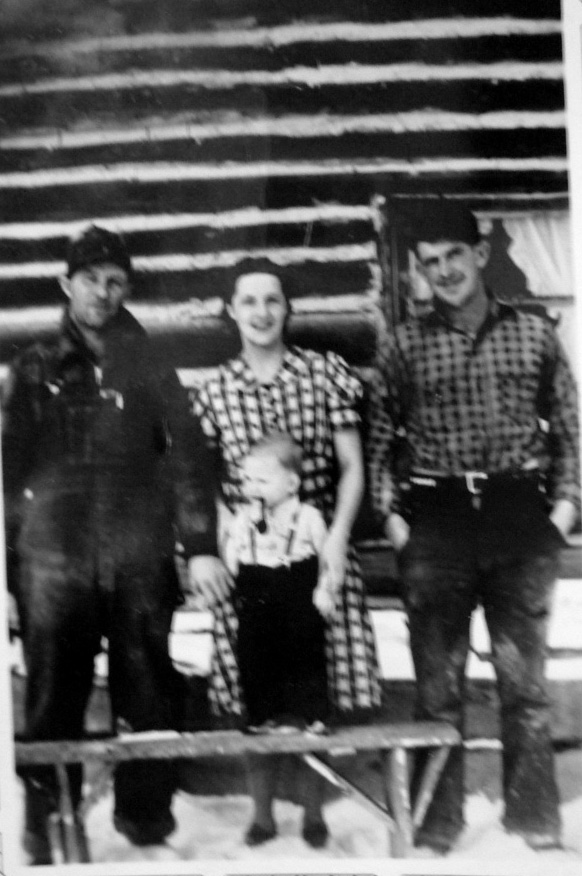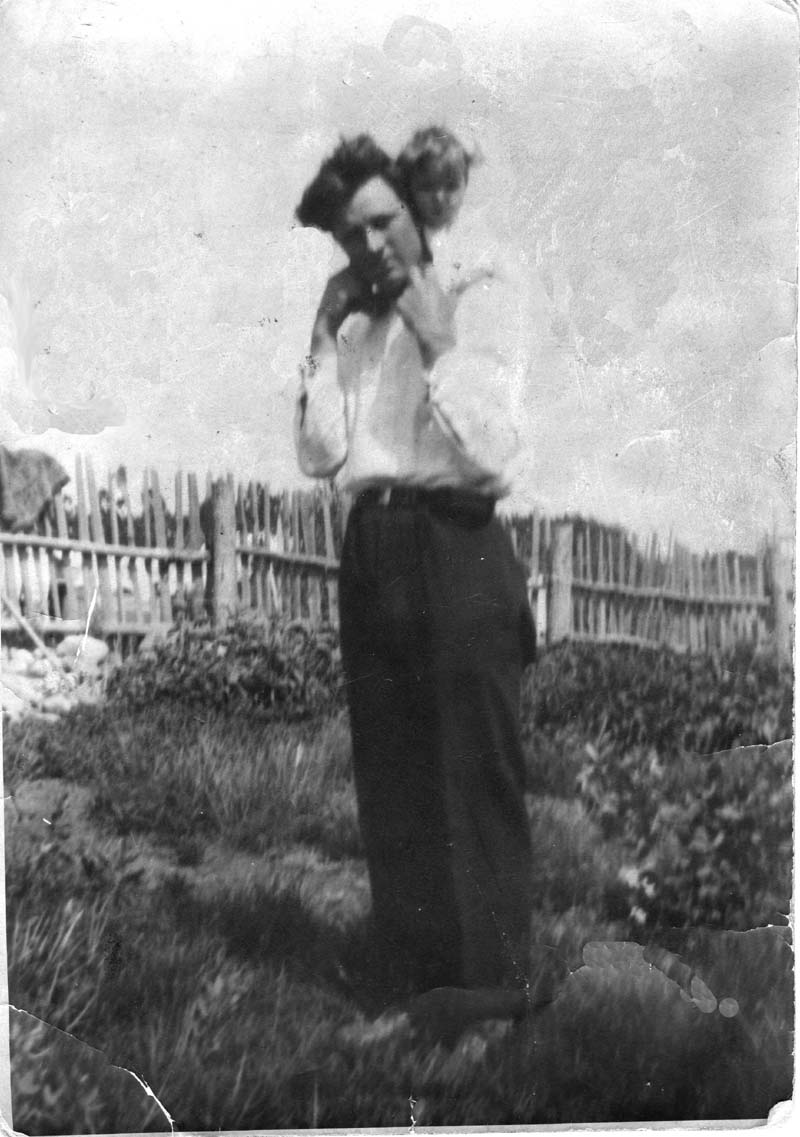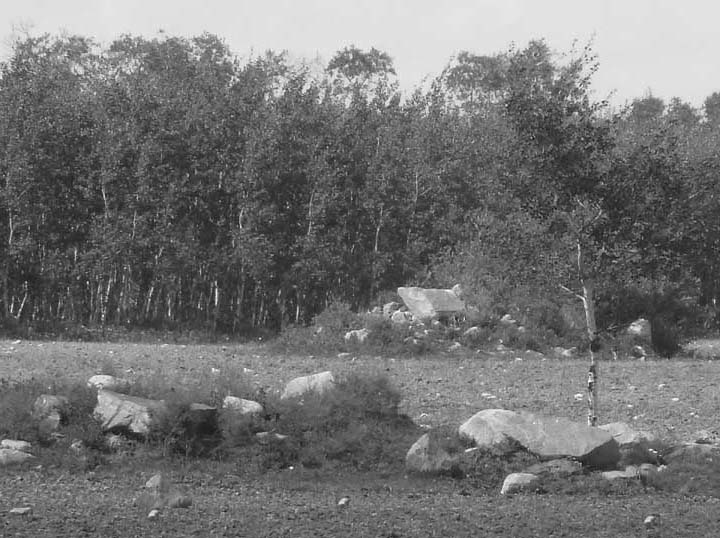Birch Lake – A Place in the Sun: Chapter 3 of 4
Photo (Harold, 2010) Dad worked this field every year trying to make ends meet. He picked those rocks that came back every year as the frost heaved them out of the ground.
Link to Next Post: Fire Tower
Link to Last Post: A New Beginning
Link to Family Stories Index
1943
As the horses dragged the stone boat around the field, Dave trudged alongside picking rocks and tossing them on the platform. The fence lines and small islands in the field were piled high with rocks of every shape, size and colour, discarded there over three decades by Dave, his brothers and their dad. Each spring a new crop would appear so the men laughingly called themselves “prairie rock farmers” 1.
As searing heat rose in waves from the summer fallow, Dave looked out at another ten thousand rocks strewn across the seemingly endless field. God only knows, it all seemed to so bloody hopeless.
As he trudged silently along he mulled over a life that seemed defined by these rocks:
“What in hell am I doing here? I have been picking these same god forsaken rocks since I was ten and next year, will be picking them again, then again and again. Will it ever end? There must be more to life!
He shuddered, “I need a change or I will go crazy!” As he said this he grabbed a rock and flung it hard against the pile forming in the centre of the field. The horses jumped as it ricocheted loudly, rejoining the myriad still waiting on the field.
Mother Nature – there was no way she was going to be thwarted! Dave continued to think long and hard about why he continued to stay in Birch Lake. The thought of ‘chucking it all’ and moving on excited him.
Many of his family and friends were leaving, or had already left, for Alberta and British Columbia. He had heard stories about golden opportunities in places such as Cold Lake, Peace River, Whitehorse and Prince George. At thirty-five he knew his prime working years were slowly ebbing away like the water in the summer salt flats that left the parched land, dry and cracked.
He had watched as his own dad had grown older and weaker to the point where he could no longer keep pace. What did it get him – nothing that Dave could see or understand! Over the years his dad had been the backbone of the family, then slowly but surely he was eaten away by endless work and, in the final years, illness that left him a beaten man. Dave thought nothing of these things when he was twenty, but now as he approached his mid-thirties, it was a different story. What could he do to re-capture his zest for life?2
What really held him to the farm and Birch Lake for 35 years was a deep sense of responsibility that lead directly back to his dad and mom, his older sisters and now to a wife and young son. While he was not one to shirk his responsibilities, he also knew life on the farm was, and always would be, one long day filled with work that never seemed to advance beyond the point of just ‘getting by’. The occasional party or dance no longer provided sufficient reprieve from the seemingly endless routine. While the talented, carefree, spoiled, playboy side of my father defined much of his public persona that was just one small part of the man.
His life was also circumscribed by the turbulent times into which he was born and raised. Those of us born after 1935 or 1940 simply cannot appreciate the challenges faced by those born in the decades before that time. In the Western Democracies at least, how much more difficult it must have been to find a place in the sun.
Born in South Dakota in 1908, dad grew up through the unremitting darkness of the first ‘Great War’. While the war was concentrated in Europe, it affected every nation. By the time dad was twenty, the world began to spiral toward the ‘Great Depression’. During this ten year period, families were torn apart as men wandered the country looking for work. While established farmers had it somewhat better, it was still a constant struggle to keep a roof over their heads and food on the table.
Then, in the 1930s, much of the prairie was turned into a dust bowl. By the time dad hit his thirties the world was heading toward the second ‘Great War’. Because he was older and had an established farm, he was considered ‘essential’ on the home front. He could not join the army as had so many young men around the area and while the horrors of war could be hard to comprehend many were willing to face those horrors for the chance to get away.
 Through these challenges dad managed to develop a homestead of his own, a beautiful place later described by mom:
Through these challenges dad managed to develop a homestead of his own, a beautiful place later described by mom:
“Dave built this wonderful log home just west of Birch Lake. He had cut and peeled the logs and built on a sunny south facing slope were he planted karaganas to protect the house from the harsh winter winds that blew off the lake. Several poplar trees and a few spruce dotted the landscape around the house. He built a barn every bit as beautiful as the house. The final touch was a lush garden to grow as many vegetables as we might ever want.”
Suddenly, as an afterthought, mom added:
Oh! Do you remember the barn your dad built on the Primrose Highway north-west of Cold Lake around late fifties? Well that barn looked very much like the barn he had built at Birch Lake twenty-five years earlier. What made it easier building in Cold Lake was that he now had his own portable saw mill. He was so proud of that barn but I often wished he had built the house first. As it was we ended up living in a small one room building while he made plans to build another log home. He was such an industrious man but it seemed that life often thwarted his best intentions.”
Dad’s house at Birch Lake was about three miles north-west of his mom and dad’s homestead so he was able to continue helping with the work on the home place. The chores increased tremendously when his dad became ill in the mid-1930s passing away in 1938.
Aunt Pat, dad’s youngest sister, the only child left at home during those final few years, remembered how tough it was for the whole family:
“My dad, your grandfather, was in his early 70s and mom in her mid-60s. Dad had been sick and the work of keeping up the farm was well beyond him. Although the farm had provided our family with a wonderful life, it only did so when there were a lot of young hands to keep things going. After most of the kids had left (there were eleven of us) Dave and I were really the only ones left to help out at home.
Just prior to my dad’s death in 1938, I married Art Schirrmacher. Art and I had talked about taking over the farm but we were young and wanted to move on to start a life of our own. Like my brother Dave, neither Art nor I thought the old home place would provide much of a future. Dave was still working the farm as best he could but I knew he wanted a change from the endless routine which had begun when he was no more than ten years old.
It was not long after dad died that mom took up with a man from Battleford. Mom knew she could not handle things on her own and was very lonely after dad died. As I recall this new guy was married but told mom he was getting a divorce so he could marry her. Of course that never happened and the guy continued strung to string her along for several years. He mortgaged the farm to the hilt and spent all her money, then left. She became very depressed in her final years.
Dave had continued working the farm until this guy moved in but it soon became clear that Dave neither liked, nor trusted the man. When mom made it clear she was determined to go it alone with this ‘loser’, Dave simply called it quits. He took what little equipment he owned and continued to farm his own place.
He already had plenty of other responsibilities as he was helping our sister Irene who was supporting herself and her daughter, Joyce. Irene had had a home at a beautiful spot on Bogarts Bay on the east end of Birch Lake 2 but no means to earn a living.
After he gave up working the old home place, Dave went ahead and built an additional bedroom on his home so Irene and Joyce could move in with him. This worked well for a few years until he married Laura in 1940. Irene had continued to work as a cook for various road camp crews during the summer and then back to Birch Lake in the winter.
Our other sister, Elizabeth (Liz) was also going through some very difficult times. Both her eighteen year old son, Harvey, and husband, Tart, were ill and were often both in the hospital in Edam or Battleford. Dave and other family members were doing what they could to help as Dave lived just a little north-east and Lizzy’s oldest daughter, Marge, and her husband, Albert, lived on the next section west.
In early 1944, Harvey passed away and then, a few months later, Tart also passed on. Our sister was devastated but she had to continue as she still had three kids left at home; Emerson, Betty and the baby, Stanley. It went without saying that Dave, Albert and Marge would continue to help her and the kids as best they could.” 4
It was in the midst of these troubling times that some good news did emerge. Mom and dad found out another person was seeking to find a place in the sun – mom was pregnant. It was a joyous moment for the young couple as mom was from a family of ten and dad, a family of eleven. They might never reach those numbers but two would be a good start.
 After a long, hot summer and crisp fall, dad made damned sure he got his expectant wife to the hospital in plenty of time. Although there was no snow and the roads were good, dad had no taste for a repeat of that desperate dash to the hospital before their first baby was born.
After a long, hot summer and crisp fall, dad made damned sure he got his expectant wife to the hospital in plenty of time. Although there was no snow and the roads were good, dad had no taste for a repeat of that desperate dash to the hospital before their first baby was born.
On October 15, 1943, the proud parents and their two and half year old son were presented with a bouncing baby girl, Louise Kathleen McNeill. After a few days hospital rest, it was back to Birch Lake and the work routines of farm life at Birch Lake.
Suddenly, one day in the spring of 1944, dad announced he was taking a job as a Fire Ranger at a Station near Meadow Lake, 150 miles northwest. He had probably looked at the bumper crop of rocks slowly emerging during the spring melt and silently vowed: “No way, I will never pick these rocks again!” His decision to leave the farm was ‘cast in stone’.
For mom, if she thought she was isolated at the farm in Birch Lake, the moves she and her family would make over the next several years would continue to keep them far in the backwoods. With the exception of a few life or death events, however these would count among the best of times in her young life.
Barely a month later, in May 1944 the family moved into the small ranger cabin north of Meadow Lake.4 It was a far cry from our home on Birch Lake but mom, ever true to her character, soon turned that cabin into a warm, cozy, welcoming home.
For dad, his search for a place in the sun had now begun in earnest.
Parksville
May 2009
Link to Next Post: Fire Tower
Link to Last Post: A New Beginning
Link to Family Stories Index
Footnotes
1 The phrase ‘prairie rock farmer’ held particular significance in the northern prairies. Heavy winter freezing that could reach depths of ten feet, followed by the spring thaw forced rocks up from far below the surface of this southern tip of the Canadian Shield. When the snow melted in the spring the fields would be strewn with a new crop of rocks that had to be cleared before cultivating the land or mowing the hay.
These rocks were the bane of existence of those early homesteaders as they had no alternative but to walk around a field and pick them, one by one. To help with the task, farmers built an implement called a ‘stone boat’ on which to load the rocks and stones. The top of the stone boat was about eight inches off the ground so it was “easier” to load the larger rocks. It was thankless, back breaking work.
2 I never heard my father verbally express these thoughts, but if he had lived and if we had ever reached a stage in our lives where we could have talked, I am sure he would have said something along these lines. Instead, I had to discern his thoughts and motives from others who lived with him, who knew him better and who survived his sudden passing in 1965 at the tender age of fifty-six.
3 The property on which Irene and Joyce lived at the east end of Birch Lake is named Bogarts Bay. It is now privately owned by someone who at one time was going to open a retreat for troubled kids but, for some reason, that never happened. To this day, Irene’s old home on the property stands back in the bush not far from a lovely sandy beach. Aunt Pat still has a picture that house on wall of her room at the Seniors Lodge in Spruce Grove, Alberta.
4 After Dave moved his family to Meadow Lake, he returned to Birch Lake to help Liz and her three kids move into his homestead. While it did not provide Aunt Liz with a long term livelihood, there was sufficient stock and other supplies that would sustain them over the short term.
(1479)
Tags: Art Schirrmacher, Davie Lockhart, Grandma Ella McNeill, Grandpa William McNeill, Irene McNeill, Joyce Hayden, Patricia Humphries, Patricia McNeill, Patricia Schirrmacher, William Skyler McNeill
Trackback from your site.


Comments (1)